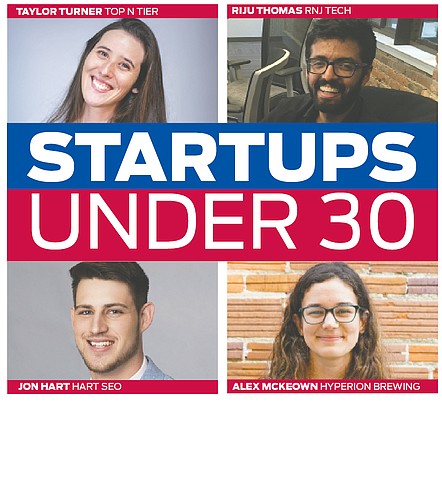
Younger entrepreneurs have a lot in common, the experts say.
They don’t fear technology. They have fewer obligations, so they can take risks. And, like all entrepreneurs, they are driven by an idea.
Karen Bowling, the inaugural director of the University of North Florida Center for Entrepreneurship and Innovation, said startup founders under the age of 30 can offset their lack of life experience and a professional network with a solid business plan and “fire in the gut.”
“Many of them know no fear, and they’re at a point in their life where they can take risks,” Bowling said.
The Jacksonville Daily Record and the Jacksonville Record & Observer profiled four area entrepreneurs under the age of 30 who started and run their companies.
They all say they started their ventures by identifying a need and setting out to fill it.
Bowling has worked with “a handful” of 20-somethings since the UNF center launched its program in 2019.
She said startup founders under 30 have a strength — less aversion to taking chances.
“They may not have as many obligations yet, so there are some advantages.”
The UNF center is a business incubator for early-stage startups and provides business counseling, mentoring and professional services with subject matter experts.
Jim Stallings, CEO at investment and entrepreneurial resource firm PS27 Ventures LLC, says young entrepreneurs have an advantage with innovation because they’re not intimidated by using technology and data.
Bowling said the UNF center doesn’t keep data on the age of its entrepreneurs and is open to startup founders across the age spectrum.
“We made a decision from the very beginning not to even ask what somebody’s age is because we’re looking for the best ideas,” Bowling said.
“There’s no age discrimination when it comes to that.”
There are numbers that show entrepreneurs age 30 and under are below the typical age of business founders.
A 2018 joint study from MIT, Northwestern University, the National Bureau of Economic Research and the U.S. Census Bureau on age and high-growth entrepreneurship found that overall U.S. startup founders from 2007-14 were 39 to 40 years old.
The median age for the fastest growing new ventures in the U.S. is 45 years old.
Younger entrepreneurs also face challenges.
U.S. Census Bureau-backed research found that 53.2% of high-growth startups with founders under the age of 30 failed compared with 45.6% with founders older than 30.
Bowling said regardless of age, barriers for most entrepreneurs are the same.
“It’s a process, right? What’s your idea? Who are your customers? How are you going to get that first customer? How are you going to price that service or product? And those ideas don’t care if you’re 12 or 50, really.”
Stallings said access to capital and investment should not be considered the biggest barrier for young founders, but challenges come when their company is ready to grow.
He tells entrepreneurs working with PS27 their biggest barrier is understanding the market for their product or solution.
“They have a good product (or) solution,” he said. But they need to figure out “who is the customer and how do I sell it?”
Stallings, a former general manager of global markets at IBM, founded PS27 in 2012. The firm is an early-stage investor in startup companies with a fully formed product or service.
In 2020, PS27 invested $2 million in cash and services in five companies after analyzing 600 deals and proposals.
The five startups were split between Tampa, Orlando and one in Northeast Florida, according to the firm.
Stalling said PS27 is expecting its biggest investment year to date in 2021 and expects to analyze 940 deals. He said PS27 likely will invest in 2% of those proposals.
Stallings said the generation of people age 30 and younger has a different outlook on employment, which he thinks is leading to more entrepreneurship.
“Most of my generation grew up thinking we’re going to work in a corporation or the company for 30 years, retire and get a watch,” he said.
“This generation that’s coming along, their starting point is some form of self-employment. They may start out on a big company, but I think (entrepreneurship) is a thought in the back of their mind.”